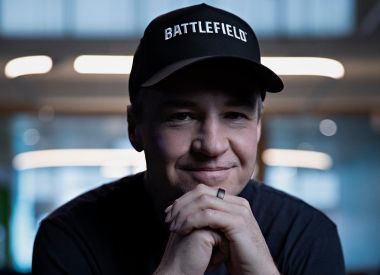The prevalence of League of Legends may not be on par with sports organizations like the NBA, but League Championship Series Chairman Dustin Beck believes that eSports could one day eclipse conventional sports in the U.S. (as it has in China). He devoted his GDC 2016 panel to explain how both the LCS and its fanbase developed resepct and admiration for each other first, before the mainstream caught up to what eSports have to offer. When it was a new product, though, eSports wasn’t always an easy sell.
“I vividly remember being on a conference call with the Staples Center in 2013 … and they were like ‘we have no idea what you’re talking about,’” said Beck. “They said ‘You’re gonna have a bunch of people come to the Staples Center to play video games?’ And we said ‘No,no, no you’ve got it wrong. We’re gonna have people at the Staples Center to watch people play video games.”
Riot Games did book the Staples Center, and sold it out in an hour. Beck emphasized the point by showing a slide from a sparsely attended NBA game before showing the jam-packed 2013 World Championship. It was a real watershed moment for eSports, which has humble roots in the oft ballyhooed LAN parties of the late 90s. Beck himself was an early competitive gamer, once the #2 ranked Battle.net player for Warcraft 2 and an early Rainbow Six devotee.
“Competitive gaming was entirely different back then,” he said. “If you were lucky you could buy a few packs of Magic cards with your winnings. But I still loved it. And I knew we were just touching the surface of it's potential.”
Beck said the success of eSports is due in large part to respecting the people who support it. Unlike traditional sports, which treat championship events as exclusive, high-priced affairs, the LCS never wanted to price out the fanbase. It’s a younger base without a lot of disposable income. It’s also one of the most loyal.
“The 2015 NALCS Summer Split Finals were at Madison Square Garden and tickets were priced as low as $35,” said Beck. "Even MSG thought we were crazy. They advised us and said the tickets were way too low. That we’d see tickets going for huge premiums on secondary sites. But this event actually had the lowest number of tickets for resale ever on Stubhub."
In order to service this fanbase, Beck explained that LCS took a cue from traditional sports and began to schedule seasons. Building a sense of community is easier with a focal point to gather around, and he gave a prominent example.
"Part of the magic of Sunday football is that it's always on Sunday," he said. "We needed an ecosystem that was consistent, that was easy to understand."
None of this is possible without the athletes themselves, and Beck made plenty of comparisons to his own idols, like Kirk Gibson and Kobe Bryant. In order for those men to achieve status in a sport they were able to live in an environment where all they had to do was train and play. In the early days eSports champions would work dayjobs to make ends meet.
"To be at its best the sport deserves pros with dedicated careers, they shouldn't have to have a second job," he said. "They should only be concerned with practicing and playing at their absolute best."
Riot began providing winning teams with larger prizes, but also guaranteed a minimum salary for all pros regardless of whether they win or lose. Soon after the players began getting steady pay the level of play improved anyway, which made tournaments better to watch and brought in ever increasing audiences. Again, LCS wanted to keep the focus on the fans so even as its champions became global celebrities, Riot made sure they were always available to interact in meaningful ways at events.
"If you actually can fork over the $10k per Super Bowl ticket, you're likely not gonna Dab with Cam Newton ... or ask Peyton Manning for a slice of his Papa John's pizza," he said.
Beck said Riot wanted to challenge the intentional separation between players and fans in traditional sports. The future of the LCS will likely follow this fans-first trajectory, particularly now that many outside parties "have seen the numbers and want a piece of the pie." But Beck considers the LCs to be stewards of a sport that has a long life ahead.
"Sports evolve over the course of decades, even centuries in some cases. And in comparison eSports has grown up at a furious and breakneck pace," he said. "Our vision when we set up the LCS was to start something that set the foundation for years, even decades, to come."


















